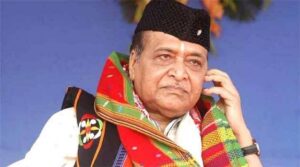Guru Rewben Mashangva is not just a name, but a movement—a living legend who has dedicated his life to preserving and popularising the rich folk music traditions of the Tangkhul Naga community in Manipur. Known affectionately as the “Bob Dylan of the Nagas,” Rewben’s signature fusion of indigenous folk sounds with Western musical styles has earned him nationwide acclaim and positioned him as one of Northeast India’s most prominent cultural ambassadors.
In this blog, we dive into the life, legacy, and musical journey of Guru Rewben Mashangva—a custodian of indigenous identity, and a symbol of resistance against cultural erasure.
Early Life and Cultural Roots
Guru Rewben Mashangva was born in Choithar village in Ukhrul district, Manipur. Belonging to the Tangkhul Naga tribe, Rewben grew up immersed in tribal customs, stories, and melodies passed down orally through generations. He was introduced to traditional Tangkhul music at a young age through community gatherings and festivals, where music was an inseparable part of storytelling and spirituality.
Despite growing up in an era when Western music had become dominant in Northeast India, Rewben remained deeply connected to his roots. This early exposure laid the foundation for his future mission: to revitalize and modernize traditional folk music while preserving its cultural integrity.
Musical Evolution and Innovations
Rewben’s journey as a musician began in earnest during the late 1980s and early 1990s. Initially influenced by blues and Western rock, he soon realized the fading state of Tangkhul folk traditions. Alarmed by the decline of indigenous music among the younger generation, he resolved to blend Western elements with tribal melodies to make folk music more accessible and appealing.
He revived forgotten songs, reintroduced traditional instruments, and began composing original music that resonated with contemporary listeners without compromising on authenticity.
Tangkhul Folk Blues
Rewben coined his unique musical style as “Naga Folk Blues,” a genre where traditional Naga folk instruments meet guitar riffs, harmonicas, and soul-stirring vocals. At the heart of his innovation lies the fusion of indigenous lyrical themes—love, nature, community, and spirituality—with blues structures.
He introduced audiences to a new sonic experience while remaining grounded in tribal aesthetics. His music, mostly sung in the Tangkhul dialect, evokes nostalgia, resistance, and cultural pride.
Traditional Instruments and Costumes
One of Guru Rewben Mashangva’s most significant contributions is the revival and reconstruction of indigenous musical instruments. These include:
- Tingteila: A traditional Tangkhul fiddle made from a coconut shell, wood, and horsehair.
- Yangkahui: A bamboo mouth organ used for producing droning sounds.
- Theku: A percussion instrument made from wood and animal skin.
Rewben often performs in traditional Tangkhul attire—complete with feathered headgear, bamboo pipes, and woven tribal patterns—making every performance a living museum of Tangkhul heritage. His appearance is not just aesthetic; it’s an assertion of identity and continuity.
Albums and Notable Songs
Over the decades, Rewben Mashangva has released multiple albums that explore various aspects of Tangkhul life, oral history, and the human condition. Some of his most celebrated works include:
- “Naga Folk Blues” – A pioneering album that showcased his new genre.
- “Creation” – A conceptual album exploring creation myths and folk narratives.
- “Kachara” – A collection of tribal songs presented in a contemporary format.
Songs like “Thingkong Kachara,” “Wui Luire,” and “Hao Na Luithui” have become anthems in Northeast India, resonating with both rural and urban audiences alike.
National and International Recognition
Guru Rewben Mashangva’s relentless efforts to revive folk traditions have earned him widespread recognition. He has performed across India and abroad, representing Northeast Indian culture at prestigious music festivals, academic seminars, and cultural exchange programs.
Awards and Honours
- Padma Shri (2021) – India’s fourth-highest civilian award, conferred for his contribution to folk music.
- Sangeet Natak Akademi Award – Recognizing his excellence in tribal and folk music.
- Manipur State Kala Akademi Award – For cultural preservation through music.
His performances have been featured at the Hornbill Festival (Nagaland), Ziro Festival of Music (Arunachal Pradesh), and various international platforms, where he continues to bridge the gap between tradition and modernity.
Cultural Advocacy and Community Work
More than a performer, Rewben is a teacher, cultural activist, and oral historian. He often conducts workshops in schools, colleges, and villages to educate youth about indigenous music and language. He encourages younger generations to embrace their roots and take pride in their heritage.
He has also collaborated with filmmakers and documentarians to preserve tribal songs and stories in digital formats. His work with community elders to document folklore has been instrumental in sustaining intangible heritage.
Guru Rewben’s Influence on Modern Musicians
Rewben’s groundbreaking work has inspired a new wave of folk musicians across Northeast India and beyond. His son, Saka Mashangva, has followed in his footsteps and performs alongside him, ensuring the continuity of his vision.
Modern Naga and Manipuri artists increasingly incorporate traditional sounds into their music, often citing Guru Rewben as a guiding force. His ability to modernize without diluting authenticity has become a blueprint for sustainable cultural revival.
Challenges Faced
Despite his acclaim, Guru Rewben Mashangva has faced significant challenges:
- Cultural Amnesia: Urban migration and globalization have led many young Nagas to abandon traditional music.
- Lack of Institutional Support: Funding for folk music preservation is limited, and indigenous artists often struggle for mainstream visibility.
- Linguistic Barriers: Tangkhul songs have limited reach outside their communities, making it harder to appeal to pan-Indian audiences.
Yet, Rewben continues undeterred, holding steadfast to his mission of cultural revival through music.
Media Appearances and Documentaries
Guru Rewben Mashangva has been featured in several national and international documentaries and television programs that highlight his life and mission. Notable among them are:
- “Songs of Mashangva” – A critically acclaimed documentary that captures his travels across Manipur, collecting lost songs and connecting with elders.
- Interviews with NDTV, Doordarshan, and BBC, where he speaks passionately about the need to preserve dying cultures.
These appearances have helped elevate his profile and draw attention to the rich musical traditions of Manipur.
Vision for the Future
At the heart of Guru Rewben Mashangva’s music is a vision—a future where folk traditions are not just preserved in archives but lived, sung, and celebrated. He dreams of creating a Folk Music Academy in Manipur, where traditional instruments, songs, and stories can be taught formally to younger generations.
He also advocates for policy support from the government to fund grassroots cultural programs, especially in remote tribal areas. His legacy will not only be his music but the movement he started—one that celebrates, preserves, and reimagines indigenous culture.
Conclusion
Guru Rewben Mashangva stands as a beacon of cultural resilience in an age of rapid globalization. A true son of the soil, he has turned his life into a tribute to the Tangkhul Naga heritage. By blending traditional music with contemporary flair, Rewben has given a new voice to forgotten stories and inspired countless others to look back even as they move forward.
In Manipur, in the Northeast, and across India, he is much more than a folk musician—he is a guardian of memory, a messenger of tradition, and a symbol of indigenous pride. His music is not just to be heard; it is to be felt, remembered, and carried forward.






